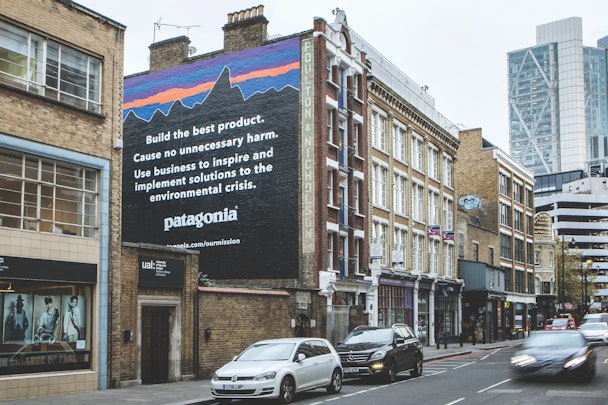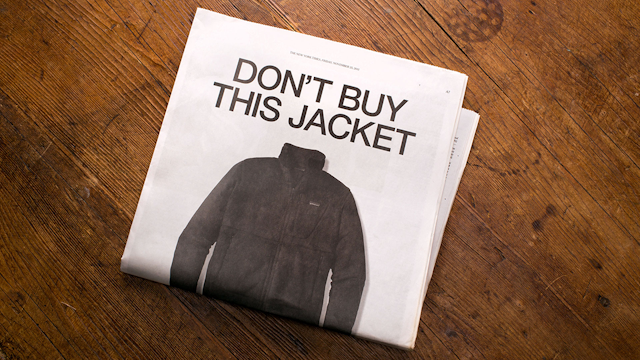
Advertisement

Brand of the decade: Patagonia
As we wave goodbye to 2019 - and the 2010s - The Drum editorial team look back at the agencies, brands, people and campaigns that have proven that marketing can change the world. And for putting its money where its mouth is in a decade where many paid mere lip service to brand purpose, here is our brand of the decade – Patagonia.
It may appear unusual to give our brand of the decade honor to one that seldom advertises – at least not in the conventional sense, anyway. But then very little about our winner of this accolade, Patagonia, conforms to marketing orthodoxy.
Of the handful of ads the outdoor clothing company ran in the 2010s, its most memorable was a one-off black-and-white placement, printed in The New York Times, showing its signature fleece under the headline ‘Don’t buy this jacket’. Published on Black Friday 2011, this piece of ‘anti-marketing’, as it was dubbed, spelled out vividly the environmental cost of manufacturing the product and urged customers to think twice about getting one. A year on, Patagonia’s sales had shot up by 30%.

Riding a rising current of conscious consumerism, those sales have only continued to grow. And that’s because when consumers look at Patagonia, they see a brand that embodies its unabashed values. Take the murals that started appearing on the sides of buildings in London’s Shoreditch in November 2017. The medium didn’t look like advertising, and neither did the message – a facsimile of the mission statement stenciled on Patagonia’s own boardroom walls: “Build the best product. Cause no unnecessary harm. Use business to inspire and implement solutions to the environmental crisis.”
In the wrong brands’ hands, such proclamations could easily ring hollow, but nobody could accuse Patagonia of not making good on its vows. Since 1985, it has pledged 1% of sales to the preservation and restoration of the natural environment, awarding more than $89m in cash and in-kind donations to domestic and international grassroots environmental groups to date. It has also habitually rejected the avarice of Black Friday, donating every penny of the record $10m sales it raked in on that bumper shopping day in 2016 to environmental charities. Even if you snag your hiking jacket on a rock, Patagonia will mend it for you free of charge, thanks to its traveling repair service, WornWear.
Such is Patagonia’s conviction to this higher cause, it has frequently found itself in direct opposition to the highest powers in its homeland. In December 2017, it turned its retail website black, save for the words ‘The President Stole Your Land’. The new landing page was an attack aimed squarely at the Trump administration, in response to announcements that the president was rolling back protections on the Bears Ears and Grand Staircase-Escalante national monuments in Utah. The row has rumbled on ever since and, as this magazine was going to press, it was revealed Patagonia was also preparing to take the president to court over his new Endangered Species Act regulations.

Of course, Patagonia itself is not an NGO (even if it occasionally acts like one) and while it may espouse an anti-consumerist agenda, it is ultimately a capitalist success story, with annual revenues said to be in the region of $1bn. As a 2015 New Yorker brand profile put it: “It is confounding to try to draw lines around when Patagonia’s marketing encourages sales and when it discourages them.” But this is all part of the brand’s appeal, and the reason why it has achieved that elusive holy grail of purpose and profit.
At the end of a decade that has seen ‘brand purpose’ become one of marketing’s biggest (bullshit?) buzzwords, Patagonia is a reminder to all advertisers that actions speak louder than words. Although even scored on copywriting alone, the brand would’ve still had a good shot at nabbing this accolade.
Just take these words from Patagonia’s founder, rock climber turned entrepreneur Yvon Chouinard, and you’ll see why its principles are so deeply ingrained. “When I die and go to hell, the devil is going to make me the marketing director for a cola company,” he wrote in his best-selling memoir ‘Let my people go surfing’. “I’ll be in charge of trying to sell a product that no one needs, is identical to its competitors and can’t be sold on its merits.”
As our brand of the decade demonstrates, it takes more than mere marketing to be a brand with real purpose.